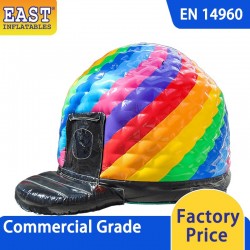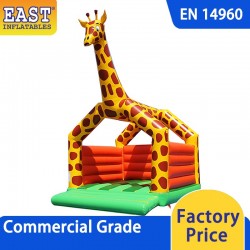
Inflatables have become a ubiquitous presence in both residential and commercial settings. From bounce houses to giant advertising balloons, these air-filled structures add fun, flair, and functionality to various spaces. However, residential and commercial inflatables differ significantly in terms of design, purpose, and regulations. In this article, we'll explore the key distinctions between these two categories.
Design and Size
One of the most noticeable differences between residential and commercial inflatables is their design and size. Residential inflatables are typically smaller and designed with a focus on providing entertainment and enjoyment for families and small gatherings. They often feature vibrant colors and creative themes, such as castles, animals, and superheroes. In contrast, commercial inflatables are larger and more robust, designed for heavy usage. They often come in more neutral or corporate colors to suit a broader range of events and settings.
Purpose
Residential inflatables primarily serve as sources of entertainment for children and families. They are commonly used in backyards, for birthday parties, or other small private gatherings. These inflatables are meant for short-term use and can be easily set up and taken down.
Commercial inflatables, on the other hand, are built to serve multiple purposes. They are designed to withstand heavy usage at public events, fairs, amusement parks, and corporate gatherings. Commercial inflatables may include bounce houses, obstacle courses, water slides, and advertising inflatables, each tailored to specific events and industries.
Durability and Materials
Residential inflatables are typically made of lighter materials and are not designed for continuous or heavy use. They may be constructed from materials like nylon or lightweight PVC. In contrast, commercial inflatables are built to be much more durable. They use heavy-duty materials, such as commercial-grade PVC, reinforced stitching, and other robust components that can withstand constant use and varying weather conditions.
Regulations and Safety
Safety regulations for residential and commercial inflatables also differ significantly. Residential inflatables are subject to fewer safety regulations and inspections, primarily because they are intended for personal use. However, users must still follow guidelines related to proper anchoring, supervision, and weight limits to ensure safety.
Commercial inflatables are subject to strict safety standards and inspections, as they are used in public spaces and often for commercial gain. These standards ensure that commercial inflatables are set up, operated, and maintained in a way that minimizes risks to users. Compliance with regulations is essential for the safety of both operators and participants.
Conclusion
Residential and commercial inflatables serve distinct purposes and come with their unique characteristics and requirements. While residential inflatables are designed for private entertainment and are smaller in size, commercial inflatables are larger, more robust, and subject to stringent safety regulations. Understanding these differences is crucial when choosing or operating inflatables in either a residential or commercial setting. Ultimately, whether for fun or profit, inflatables offer a world of joy and excitement, catering to the diverse needs of our communities.




Leave a Comment